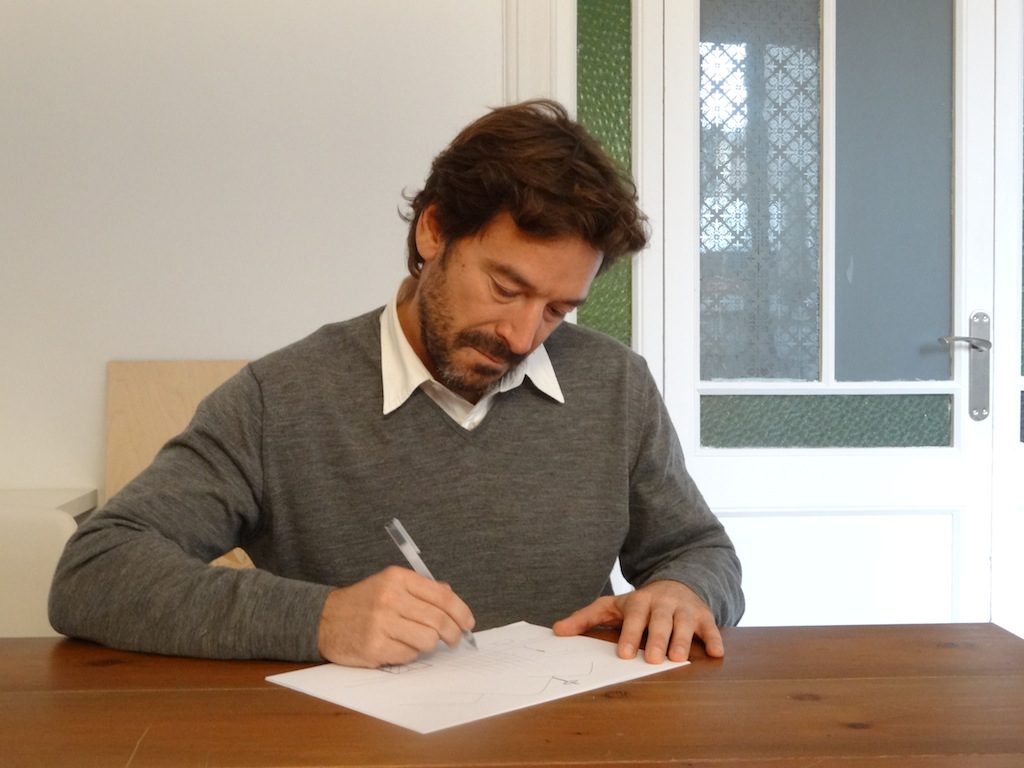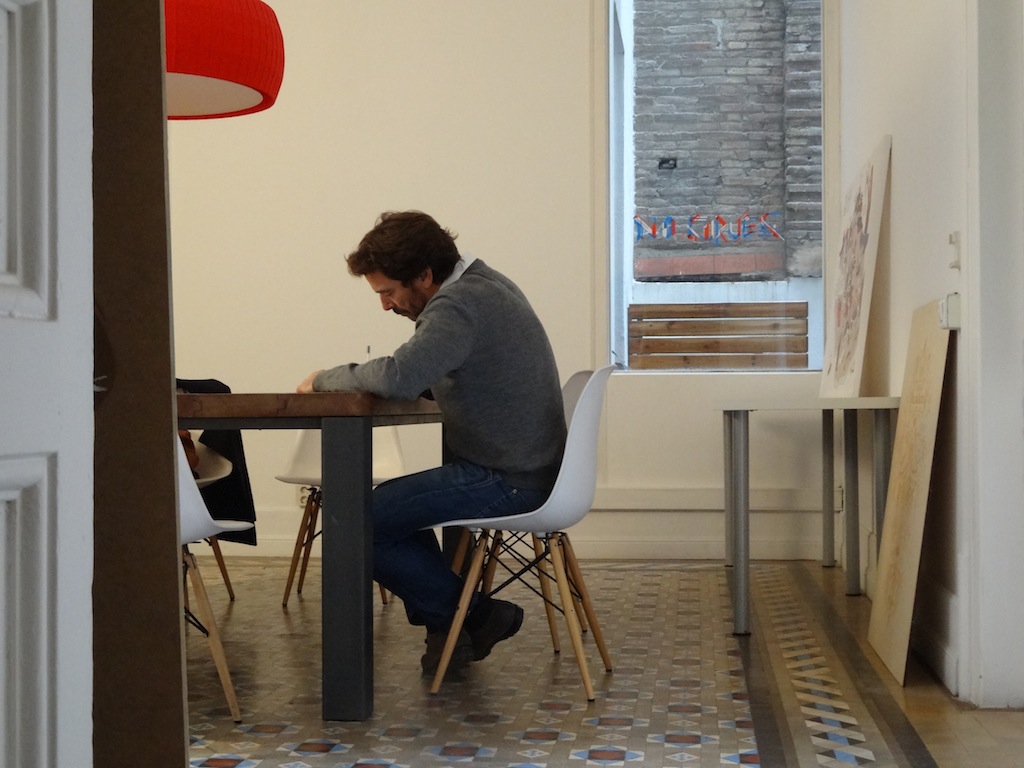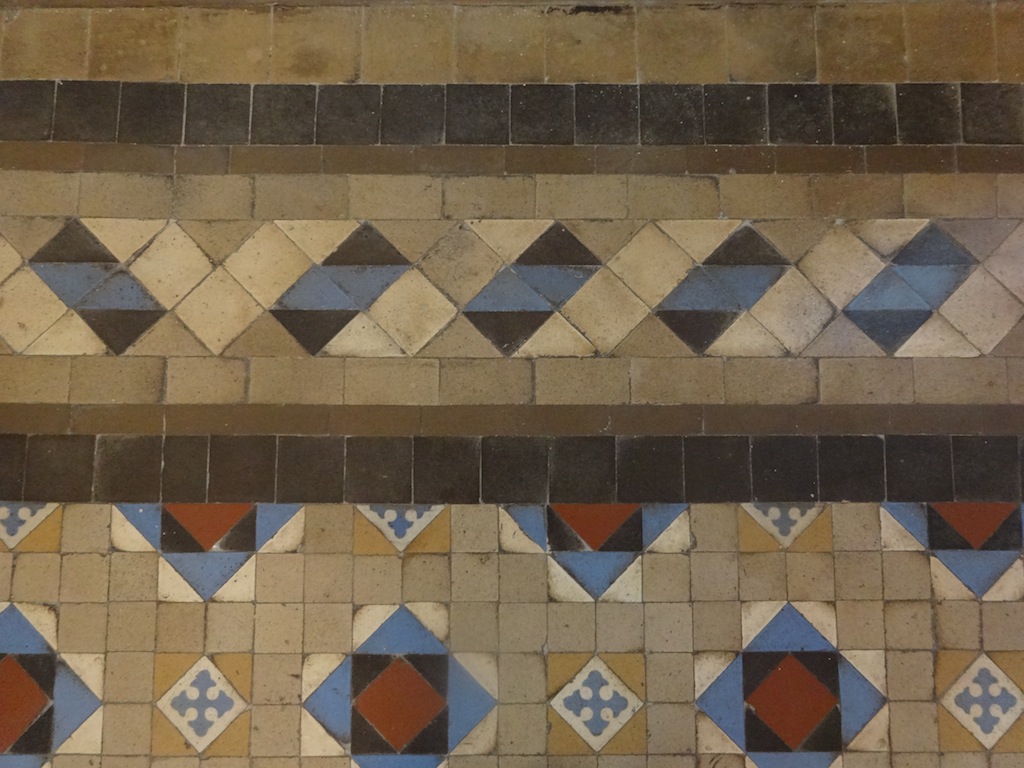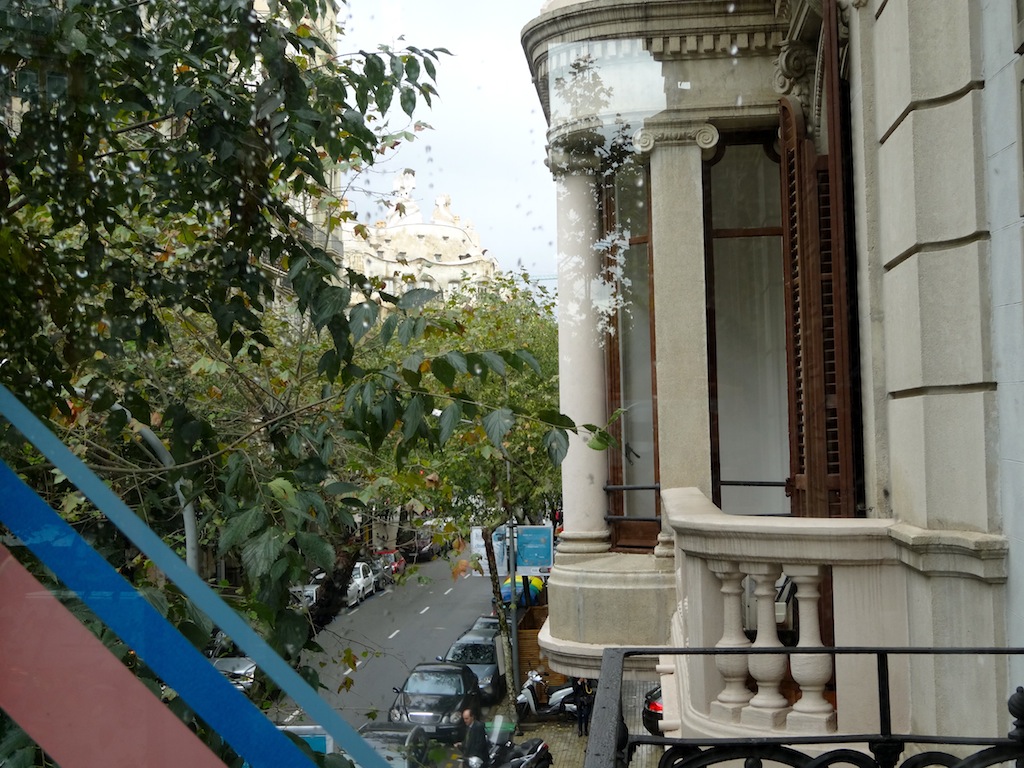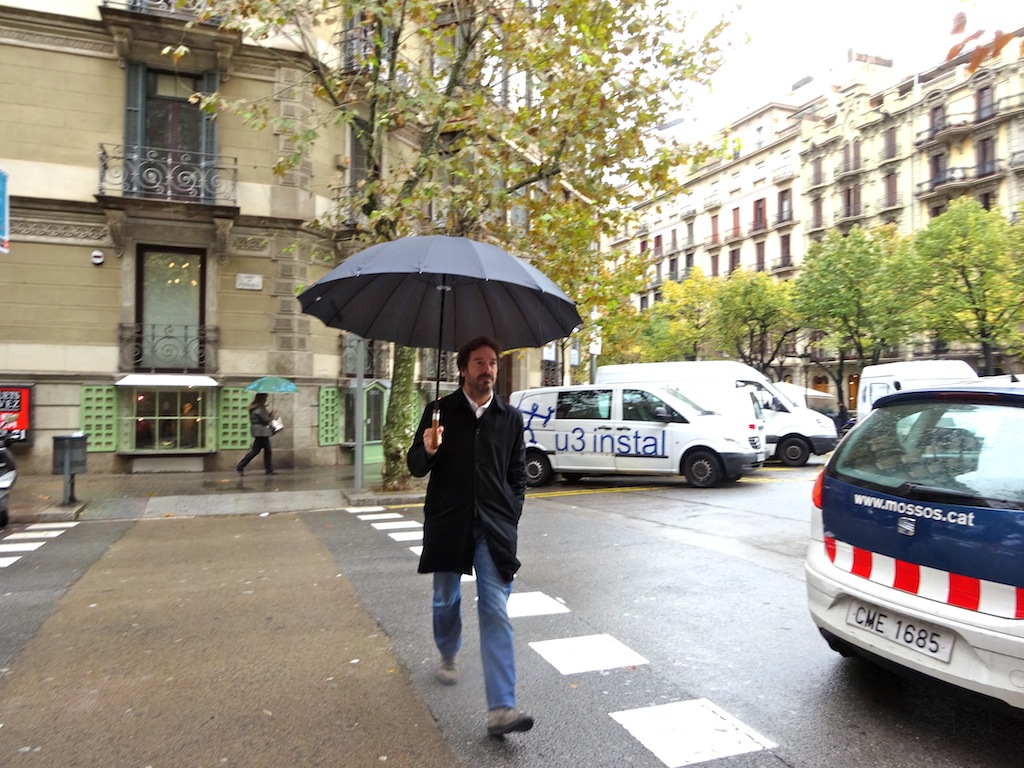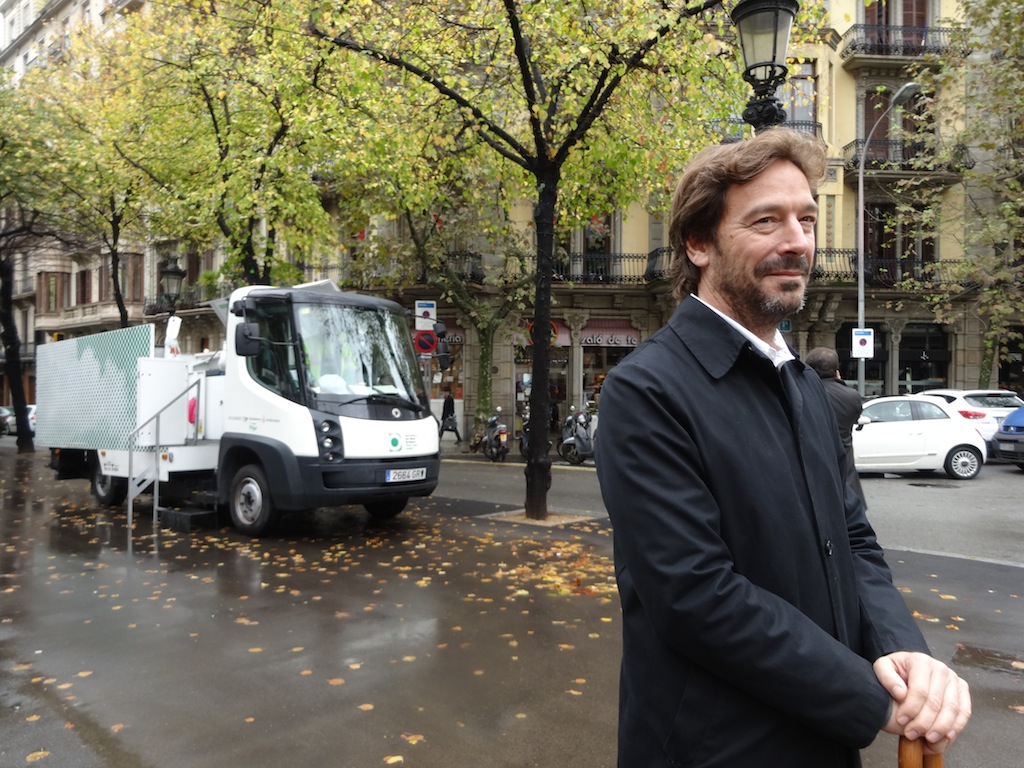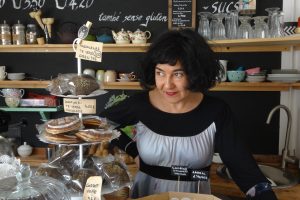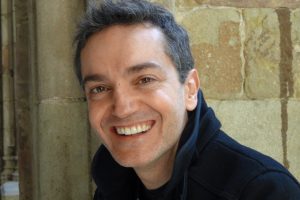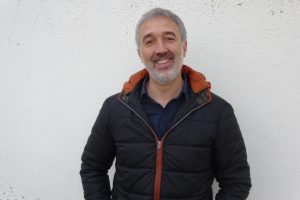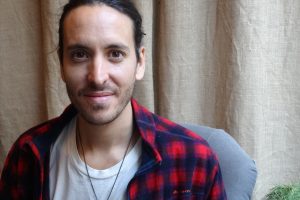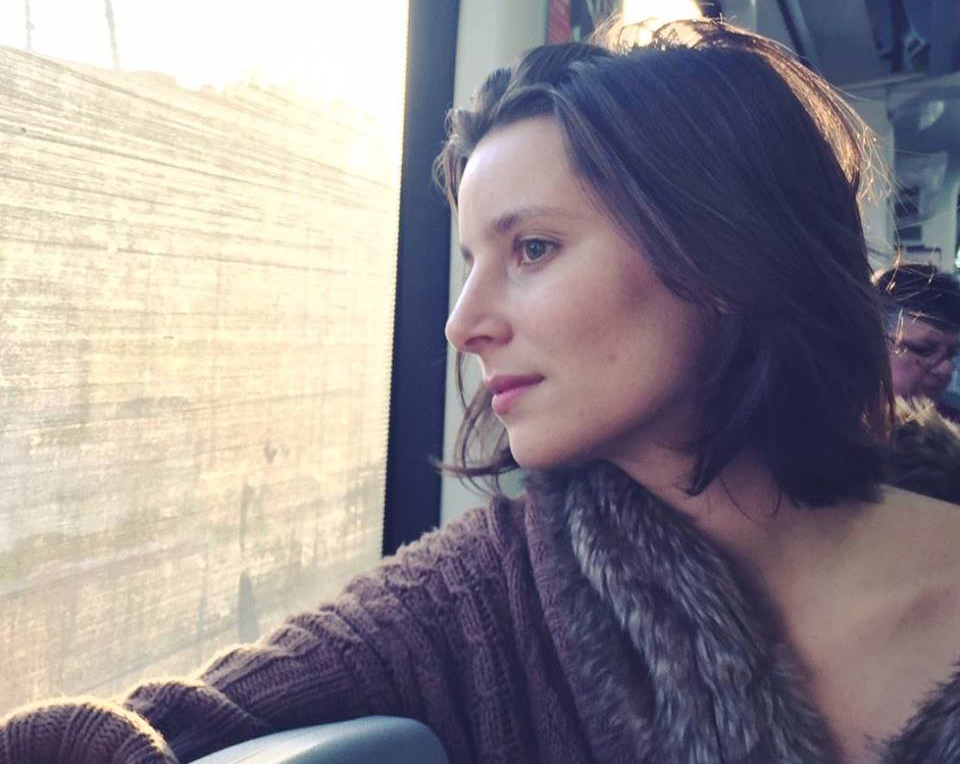Pablo Zea, cofundador de SantaMarta
It seems that autumn has finally arrived to Barcelona and I enjoy it walking along Rambla Catalunya with Pablo Zea (Madrid, 1969). As we get closer to the office of his advertising agency, SantaMarta, he tells me about the process of creating an agency in the middle of the recession, his latest projects, how has been his personal relationship with Barcelona, how fatherhood has changed his way of being in the city and several other topics. Pablo belongs to the X generation, that group of people who were caught by the crisis during their professional splendor. It is a great inspiration to see how he has found, along with Fernando Codina, his partner, a way (simple, humble and tenacious, incredibly creative) to do what they like the most. In Colombia, Santa Marta is the patron saint of the impossible things, but theirs is now a reality.
‘Barcelona has almost everything to be an ideal city where to live. Not where to work.’
You were born in Madrid, when did you arrive to Barcelona and what did you think of it?
Yes, my family lived in Ibiza, but I was born in Madrid basically because my mother went there to give birth. When I was two years old, we moved to Arenys de Mar (a town located in the Maresme region, within a 45 minute drive from Barcelona). I remember that I had occasionally been taken to the city and that by then, in order to get to the airport, we had to cross all the Calle Aragón (‘calle’ means street in Spanish), it seemed gigantic. Then, I moved here when I started University. And, aside from long periods in which I have lived abroad, since then, I’ve been in Barcelona; this is my city. As they say ‘no eres de dónde naces, sinó de dónde paces’ (‘you’re not from where you were born, but from where you graze’).
How was the experience of settling in Barcelona in the late eighties for you?
The combination of having left home and discovering the city from the perspective of a young man, it was a time of great discoveries: different neighborhoods, new friends, the teachings of a career that I really enjoyed, a fun and pleasant time. Also, each year I lived in a different flat, so I had the opportunity to experience several perspectives. When I finished my studies, I went to Ibiza to do my military service that by then it was still mandatory and when I came back to Barcelona I settled with my girlfriend in Calle Madrazo, in a small attic with a terrace that looked over the Galvany market. We lived there for two or three years, until we moved to Paris.
And in Paris you lived for two more years, then later in your life you also lived in Amsterdam for two years and you have also travelled a lot. How is Barcelona perceived from the outside?
From the outside you realize that Barcelona is always perceived in a very positive way. It is true that it is a balanced city and it is very pleasant to live here. It has services, the distances are manageable, there is a great gastronomic offer, art and culture, we have a certain ‘cosmopolitanism’ that attracts foreign people. Then, as a business center, besides tourism and new technologies, I do not think that it is a remarkable place currently. Within the business that I know that is advertising, when I started to work in the mid-1990s, Madrid and Barcelona were balanced, even in some moments Barcelona was producing more projects. Now here we are somehow stagnant, although it still maintains a great artistic portfolio and there are enormous talents related to advertising. But our industry follows business and business here is not going through best times. It is a pity that Barcelona has lost that ‘punch’.
Why do you think that has happened?
For many reasons: starting with the crisis and then, also for political reasons. For example, I believe in the theory that says that when the autonomous Government and City Hall belong to different parties, they created a tension between them that in the long term, does not generate any positive aspect for citizens. If they are both of the same party, this tension is not there anymore and it is easier to enter in a dynamic that will be more constructive and will create the energy that cities need in order to be competitive. Apart from this, there are many other explanations; we could be analyzing them for ages.
Fernando Codina, your partner, and you embarked on the adventure of starting SantaMarta in 2009, how was the experience of launching a new agency in Barcelona and during the crisis?
In 2006 I came back from Amsterdam and was delighted rediscovering the city. I had a good job in the company where I met Fernando. In 2009 when the crisis was already a fact, the company suffered the loss of an important client; this forced them to restructure all the staff. That restructuring affected us. Although it is true that we both had the idea of staring our own thing, we had worked together for more than two years and we had fallen -professionally- in love. So in this case, the crisis precipitated a process that would have happened anyway, only that perhaps later. We could say that we had the motivation and the reason was given to us at the right moment. We knew that it would be difficult, in it actually has been and it still continues to be so. But we also had a very clear idea of what we wanted to do, what kind of service we wanted to offer, what is our way of doing things. We knew we wanted to open our own business after so many years of working for other companies. Now, both Fernando and I don’t have salaries as high as those we had before, but we wouldn’t change SantaMarta for anything.
You started the agency in the Poblenou area and now you are in Calle Provenza with Rambla Catalunya. How has this change influenced your business?
It has influenced us in a very positive way and this has gone against our original idea. We tried to be consistent with the fact that we wanted to do things differently and said that instead of seeking the typical flat of the Ensanche area, it would be more interesting if we went to an alternative location. We found a space in a former flour factory (La Farinera) in Poblenou; it was beautiful with its mezzanine and those high windows. It was all perfect on paper, but the reality is that it was not practical: we suffered floods, there were various services missing, when clients came to visit us, they couldn’t find a taxi when they left, my motorbike was stolen etc. We finally decided to move to the Eixample, where we oddly pay less per square meter, it is easier for clients to find us and we can walk from home. Yes, we are in the typical flat of the Ensanche area and, for us, it is all advantages.
Could you please explain the way of doing things differently that you just mentioned?
Well, it would be a little pretentious to say that our intention was to create a new kind of Agency. Although we defend the need to work on what you like and what Fernando and I have in common is that we both love what we do. We wanted to avoid the stereotypes that have been created within the world of advertising as, for example, the rivalry between departments in agencies, the idea that customers don’t know what they want, or the concept that as someone who has already reached a high level position, there are certain things you can not do after that… I have no problem if at a given moment, I have to sweep, to pick up the phone or roll up my sleeves and do whatever needs to be done. Advertising has created some characters, processes and ‘farandulas’ (like sector celebrities) that have been creating a bubble that does not really contribute too much to the business. In this sense Fernando and I are very ordinary guys (which does not mean that we are boring), but we are working hard and we just appreciate love and respect for a well-done job. The reward that we have from doing this goes far beyond the monetary.
I would like to know about the project that you have done for the Foundation of deaf-blind?
A friend called me saying that he collaborated with the FESOCE (Spanish Federation of the deaf blind), an association of people who are deaf and blind at the same time, and he suggested that we should do something to help them, to give them more visibility. We went to meet them and after talking for three hours, we decided that we, indeed, had to do something. That idea was transformed into an audiovisual piece that we’ve rolled together with the producing house Agosto that joined the project with great enthusiasm. In fact, I have to thank the executive producer Rafa Montilla and the filmmaker Mireia Pujol for the fantastic job they have done. Then we also had Néstor Verde who designed a web page for them and through Marina Portabella we were able to present our project to the media in the venue Luz de Gas. It is all about helping people to know that this collective exists and to be able to contribute as much as possible in order to help others.
I agree. And if Barcelona were a product, which in some ways it is, what sort of campaign would you come up with?
It is very hard to give you an idea without carefully studying the case before. Also I am aware that the Town Hall has an entire Department dedicated to promote the Barcelona brand and they are doing a great job because it is now very well positioned. Many brands are now using Barcelona as part of their own brand. That gives prestige to the city, its name gets to be known around the world. Now that you’ve raised this question, actually, a few ideas are coming to my head… We would love to create a campaign to promote Barcelona!
You have been father for three or four years, how has this changed your way of living in the city?
Now each weekend is a challenge to find plans for my daughter. That’s fantastic because you suddenly discover things that you didn’t know that existed. For example, in the Park of the Oreneta, there is a service of ponies that you can rent for a while and there is also a miniature train. There are the puppets of the Born, the Jove teatre Regina in Gracia. In fact, you get familiar with all the program of children’s shows. Then you go back to places such as the ‘merendero’ (picnic area) of Can Marti, near Collserola and you rediscover the Zoo or the Aquarium. Soon we will be going to the Tibidabo fun fair. And one of the things where we often go now is to the beach. Many locals, especially from the upper areas, don’t go to the beach in Barcelona and we have such great beaches here. Lately we’ve been going with friends who have other children and we all go there to build castles in the sand.
You just draw a great map of Barcelona for kids, how was your map before your daughter was born?
(Laughs) I almost do not remember… Before I liked going to run to the Carretera de les Aigües and, well, I had much more of a social life and knew all the bars, the restaurants. I used to frequent the old town, but the area has changed a lot in recent years, now it is more secure, easier. I liked it when it was closed, underground, ‘canalla’ (rough)… I also had the habit of going everywhere on my motorbike; Barcelona is a great city for motorcycling. Since I have become a father, I do not use it anymore, but sometimes I cycle. The city is also fine for bikes although there are too few bike lanes and I just do not feel entirely safe cycling around certain areas. I would take the space from the cars, and yield it to cyclists. That’s one of the things that could still be improved here.
To finish Pablo, what else do you think that could be improved in Barcelona?
Many things: starting with not complaining so much and taking action for real improvements. I often miss a more open attitude. I am the son of an English mother and a Canarian father, I was born in Madrid and raised in Ibiza and then in Barcelona, people from all over the world have always surrounded me. Diversity and an open mind are all natural things for me. Sometimes I have the feeling that we live asleep and that our environment often contributes to this, for example, entertainments such as football. And I wonder, what could happen if football was banned? ∗
You can visit SantaMarta here.
Parece que por fin ha llegado el otoño a Barcelona y lo disfruto paseando por Rambla Catalunya con Pablo Zea (Madrid, 1969). Mientras nos acercamos al despacho de su agencia de publicad, SantaMarta, me habla de cómo ha sido el proceso de crear una agencia en plena recesión, de sus últimos proyectos, de cómo ha sido su relación personal con Barcelona, cómo la paternidad ha cambiado su manera de estar en la ciudad y varios otros temas. Pablo pertenece a la generación X, ese grupo de gente a quién la crisis ha pillado en pleno esplendor profesional. Es una gran inspiración ver cómo ha encontrado, junto a Fernando Codina, su socio, la manera, (simple, humilde y tenaz, increíblemente creativa) de seguir haciendo aquello que más les gusta. En Colombia Santa Marta es la patrona de los imposibles, pero lo suyo ya es una realidad.
‘Barcelona lo tiene casi todo para ser una ciudad ideal para vivir. No es así para trabajar.’
Naciste en Madrid. ¿Cuándo llegaste a Barcelona y qué te pareció?
Sí, mi familia vivía en Ibiza, pero nací en Madrid básicamente porque mi madre fue allí a dar a luz. Cuando tenía cinco años nos trasladamos a Arenys de Mar. Recuerdo que me habían llevado ocasionalmente a Barcelona y que para ir hasta el aeropuerto había que cruzar la ciudad por toda la calle Aragón que me parecía gigantesca. Luego, me mudé aquí cuando empecé la Universidad. Y, a parte de temporadas largas en las que he vivido fuera, desde entonces siempre he estado en Barcelona, esta es mi ciudad. Como dicen ‘no eres de donde naces, sino de donde paces’.
¿Cómo fue para ti venir a instalarte en Barcelona a finales de los ochenta?
La combinación de marcharme de casa y luego de descubrir la ciudad desde la perspectiva de un joven que acaba de estrenar su mayoría de edad. Una época de grandes descubrimientos: los distintos barrios, nuevos amigos, las enseñanzas de la carrera que me gustaron mucho, una época muy divertida y entrañable. Además viví cada año en un piso distinto así que tuve la oportunidad de conocer varias perspectivas. Cuando terminé de estudiar, me fui a Ibiza para hacer el servicio militar que entonces aún era obligatorio y luego ya me instalé con mi pareja en la Calle Madrazo, en un ático con una terraza que caía sobre el Mercado de Galvany. Allí estuve unos dos o tres años, hasta que nos mudamos a París.
Y en París vivisteis dos años, luego más tarde en tu vida también estuviste dos años más en Amsterdam y también has viajado mucho. ¿Cómo se percibe Barcelona desde fuera?
Desde fuera te das cuenta de que Barcelona siempre se percibe de una forma muy positiva. Es cierto que es una ciudad equilibrada y que es muy agradable vivir aquí. Tiene servicios, las distancias son manejables, hay una gran oferta gastronómica, arte y cultura, tenemos un cierto ‘cosmopolitismo’ que atrae a gente de fuera, (aunque esta diversidad es un poco un mito pues hay zonas que no tienen nada de cosmopolita). Luego, como centro de negocio, más allá del turismo y de las nuevas tecnologías, en estos momentos no creo que destaque. Dentro del negocio que conozco que es el publicitario, cuando empecé a trabajar a mediados de los noventa, Madrid y Barcelona estaban más equilibradas, incluso en algunos momentos en Barcelona salían aún más proyectos. Ahora aquí estamos más estancados, aunque se sigue manteniendo una gran cartera artística y tenemos enormes talentos relacionados con la publicidad. Pero nuestro sector sigue al negocio y aquí el negocio no está pasando por su mejor época. Es una lástima que Barcelona haya perdido ese ‘punch’.
¿Por qué crees que ha sucedido esto?
Por muchos factores, para empezar está la crisis y luego también por razones políticas. Por ejemplo, creo en la teoría que dice cuando el Gobierno Autonómico y el Ayuntamiento pertenecen a partidos distintos, se crea una tensión entre ellos que puede acabar no siendo beneficiosa para los ciudadanos. Si son del mismo partido, esta tensión no existe y se entra en una dinámica algo más constructiva, dándose la energía que toda ciudad necesita para ser competitiva. A parte de ésto, hay muchas otras explicaciones, podríamos estar analizándolas hasta mañana.
Fernando Codina, tu socio y tu os lanzasteis a la aventura de abrir SantaMarta en el 2009, ¿cómo fue la experiencia de lanzar una nueva agencia en Barcelona y en plena crisis?
En 2006 volví de Amsterdam y estaba encantado redescubriendo la ciudad, con un buen trabajo en la empresa donde conocí a Fernando. Hasta que en 2009 la crisis ya era un hecho y esa empresa sufrió la pérdida de un cliente muy importante por lo que decidieron reestructurar la plantilla. Esa reestructuración nos afectó. Aunque es cierto que hacía tiempo que los dos teníamos el gusanillo de crear algo nuestro y hacía ya más de dos años que trabajábamos juntos y nos habíamos enamorado profesionalmente. Así que en este caso, la crisis precipitó un proceso que también se hubiera acabado dando aunque quizás más tarde. Podríamos decir que teníamos la motivación y nos pusieron en bandeja el motivo. Sabíamos que sería difícil, lo ha sido y lo sigue siendo. Pero también teníamos muy claro cuál era la propuesta, qué tipo de servicio queríamos ofrecer y cuál es nuestra forma de hacer las cosas. Teníamos claro que queríamos abrir nuestro propio negocio después de estar tantos años trabajando para otras empresas. Ahora, tanto Fernando como yo, no tenemos sueldos como los que habíamos tenido antes, pero no cambiaríamos SantaMarta por nada.
Empezasteis la agencia en Poblenou y ahora estáis en Provenza con Rambla Catalunya. ¿Cómo ha influido este cambio en el negocio?
Ha influido de una forma muy positiva. Esto ha ido en contra de nuestra idea inicial. Intentamos ser consecuentes con el hecho de que teníamos de hacer las cosas de forma distinta y dijimos que en lugar de buscar el típico piso del Ensanche, sería más interesante que nos fuéramos a un sitio más alternativo. Encontramos un espacio en una antigua fábrica de harinas (La Farinera) en el Poblenou, era un local precioso con un altillo y unos ventanales altos. Sobre el papel era perfecto, pero la realidad es que no era práctico: sufrimos inundaciones, faltaban servicios, venían a vernos clientes y cuando se marchaban no podían encontrar un taxi, me robaron la moto, etc. Al final nos mudamos aquí al Eixample, donde aunque parezca mentira pagando menos el metro cuadrado y a los clientes les es más fácil encontrarnos, podemos ir andando desde casa. Sí, estamos en el típico piso del Ensanche y, para nosotros, son todo ventajas.
¿Cuál es esta forma distinta de hacer las cosas que acabas de mencionar?
Bueno, sería un poco pretencioso decir que nuestra intención era crear un nuevo tipo de agencia. Aunque nosotros somos defensores de que hay que trabajar en lo que te gusta y lo que tenemos en común Fernando y yo es que nos gusta mucho lo que hacemos. Queríamos huir de los estereotipos que se han creado dentro del mundo de la publicidad como por ejemplo la rivalidad entre departamentos de las agencias, la idea de que los clientes no saben lo que quieren o la concepción de que como alguien que ya ha accedido a determinados puestos laborales, hay ciertas cosas que ya no se pueden hacer… No tengo ningún problema para barrer en un momento dado, coger el teléfono o arremangarme y hacer lo que haya que hacer. La publicidad ha creado personajes, procesos y farándulas que han ido creando una burbuja que no nos aporta gran cosa. En ese sentido Fernando y yo somos tipos muy normales y corrientes (que no significa que seamos aburridos), pero estamos trabajando duro y justamente valoramos ese amor y ese respeto por el trabajo bien hecho. La recompensa que tenemos por hacer este trabajo va mucho más allá de lo monetario.
¿Me podrías hablar del proyecto que habéis hecho para la fundación de sordo ciegos?
Un amigo me llamó diciendo que colaboraba con la FESOCE (Federación Española de Sordo Ciegos), que son gente sorda y ciega al mismo tiempo y nos propuso hacer algo para ayudarles, para darles más visibilidad. Fuimos a conocerles y después de hablar con ellos durante tres horas, decidimos que, efectivamente, había que hacer algo. Eso se transformó en una pieza audiovisual que hemos rodado junto con la productora Agosto que se sumó al proyecto con mucha ilusión. De hecho tengo que agradecer al productor ejecutivo Rafa Montilla y a la realizadora Mireia Pujol por el trabajo fantástico que han hecho. Luego liamos a Néstor Verde para que hiciese la web y conseguimos a través de Marina Portabella que nos cedieran la sala Luz de Gas para hacer la presentación a los medios. Se trata de que la gente sepa que existe este colectivo y de poder aportar lo máximo para poder ayudar a los demás.
Estoy de acuerdo. Y si Barcelona fuera un producto, que en cierta manera ya lo es, ¿qué tipo de campaña propondrías?
Es muy difícil, hacer una propuesta concreta sin estudiarlo bien antes. Además me consta que el Ayuntamiento tiene un departamento entero que se dedica a promocionar la marca Barcelona y han hecho un trabajo estupendo porque está muy bien posicionada. Ahora muchas marcas utilizan Barcelona como parte de su marca. Eso da prestigio a la ciudad y hace que el nombre suene a nivel mundial. Ahora que me has hecho esta pregunta, se me ocurren algunas ideas… ¡Nos encantaría hacer una campaña para promocionar Barcelona!
Hace pocos años que has sido padre, ¿cómo ha cambiado ésto tu manera de vivir en la ciudad?
Ahora los fines de semana se plantean como un reto para encontrar planes para mi hija. Eso es fantástico porque de repente descubres cosas que ni sabías que existían. Por ejemplo, que en el Parc de la Oreneta, hay un servicio de ponis que puedes alquilar durante un a rato o un tren miniatura. También están las Titelles del Born, el Jove Teatre Regina, de hecho te familiarizas con toda la programación de espectáculos infantiles. Luego, vuelves a ir a sitios como el merendero de Can Martí y redescubres el Zoo o el Aquarium. Dentro de poco me tocará ir al Tibidabo. Y una de las cosas donde vamos a menudo ahora es a la playa. Muchos barceloneses, sobretodo de la zona alta, no van a la playa en Barcelona y tenemos unas playas magníficas aquí. Últimamente quedamos mucho con amigos que tienen otros niños y vamos a hacer castillos en la arena.
Me acabas de dibujar un estupendo mapa de Barcelona para niños, ¿cómo era tu mapa antes de tener a tu hija?
(Risas) Casi ya ni me acuerdo… Antes me gustaba mucho ir a correr a la Carretera de las Aguas y, bueno, tenía mucha más vida social y conocía todos los bares, los restaurantes. Solía frecuentar el Casco Antiguo, pero esa zona ha cambiado mucho en los últimos años, ahora es más segura, más fácil. A mi me gustaba cuando era un lugar cerrado, underground, canalla… También tenía la costumbre de ir en moto a todas partes, Barcelona es una ciudad estupenda para desplazarse en este medio de transporte. Desde que soy padre ya no lo uso, pero sí voy en bicicleta algunas veces. La ciudad en bicicleta también está muy bien aunque hay pocos carriles ciclistas habilitados y no me acabo de sentir del todo seguro por según que zonas. Yo sacaría el espacio de los coches, para cederlo a los ciclistas. Eso es alguna de las cosas que aún se podría mejorar.
Para terminar Pablo, ¿qué más crees que se podría mejorar en Barcelona?
Muchas cosas, pero empezar por no quejarnos tanto y tomar acción para introducir mejoras de verdad. Eso a menudo pasa por una actitud más abierta. Yo soy hijo de madre inglesa y padre canario, nacido en Madrid y criado en Ibiza y después en Barcelona, siempre he estado rodeado de gente de todo el mundo. La diversidad y la apertura de miras son algo natural para mí. A veces tengo la sensación de que vivimos un poco narcotizados por el entorno, por entretenimientos como por ejemplo el fútbol. Y me pregunto, ¿qué podría pasar si prohibiesen el fútbol? ∗
La página web de SantaMarta se puede visitar aquí.
![]()

